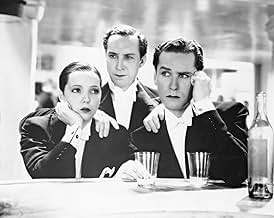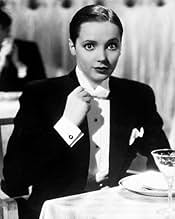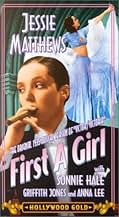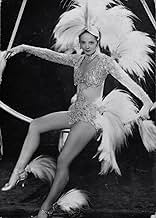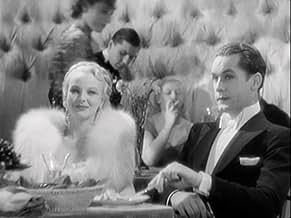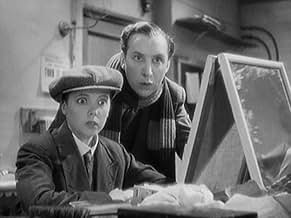Une jeune comédienne de music-hall se fait passer pour un homme qui interprète des rôles de femmes.Une jeune comédienne de music-hall se fait passer pour un homme qui interprète des rôles de femmes.Une jeune comédienne de music-hall se fait passer pour un homme qui interprète des rôles de femmes.
- Réalisation
- Scénario
- Casting principal
Alf Goddard
- Atlas
- (non crédité)
Cameron Hall
- Cast Member
- (non crédité)
Esma Lewis
- Cast Member
- (non crédité)
Enid Lindsey
- Cast Member
- (non crédité)
Jack Vyvyan
- Man Serving in Cafe
- (non crédité)
Billy Watts
- Reporter
- (non crédité)
Avis à la une
Having heard of this film years ago, I finally saw it the other night. It is a delightful showcase for the largely forgotten charms of Jessie Mathews, the queen of British musicals. The film compares favorably with Hollywood product, with good production values, pleasant songs, Busby Berkeley-like dance routines, and a lively and funny script. The storyline, adapted from the 1933 "Vicktor und Vicktoria", is remarkably close to the 1980's "Victor/Victoria", which was made so memorable by Julie Andrews great performance. Jessie Matthews, whom I was not familiar with proves to be a delightful singer, dancer and actress, and proves that Hollywood did not have a monopoly on talented leading ladies. Sonnie Hale is hilarious in the role played in the later film by Robert Preston. Because of the censorship restrictions so prevalent in 1935, I doubt that this film had an extensive run in this country at the time of it's release. The gay elements prevalent in the later film, while not directly addressed, are certainly strongly implied here. Anna Lee gives good support as "the Princess." I enjoyed this film far more than I thought I would.
First a Girl (1935)
Musicals in the 1930s were stiff mash-ups of song and dance numbers until the geometric fantasies of Busby Berkeley and then the narrative Fred Astaire movies, both in beginning in 1933 and 1934. This is a weird 1935 British affair that's well-enough filmed to remind you of Berkeley but is tepid by comparison. And as for plot, it takes awhile to get to that, following some decent and sometimes almost surreal dance/fashion scenes.
This is, in short, the original movie version of "Victor/Victoria." Once you get into the story, which will still be interrupted by old-fashioned feeling dance numbers, you'll get the cross-dressing stuff. All in fun. The leading woman (who does the switching, just as Julie Andrews did in the famous remake) is Jessie Matthews, who is a sort of Ginger Rogers type with a doll face. It's the doll face, highly feminine, that removes some of the credibility of the story--she does look slightly like a boy, when dressed as a man, but it doesn't quite carry. And of course, the point is to fool at least the other characters. The leading man Victor, played by Sonnie Hale, is also a problem, at least for audiences today, because he lacks charm, or sincerity, or pathos, or whatever might carry him through along with Matthews. He is meant to be the set-up for what "Victoria" has to do. But he's usually too dull for his own good, or he tries too hard. Matthews, at least, is purely charming and delightful. By the final number, however, when the tables are turned once again, Victor comes into his own. You might see it coming, but then it's divine.
It gives nothing away to say that the changing identities ruse is eventually suspected and the tension then begins. It's all done with a bit of stiffness, and filmed with uniform bright intensity, which makes it all a bit superficial, but is still enjoyable.
Musicals in the 1930s were stiff mash-ups of song and dance numbers until the geometric fantasies of Busby Berkeley and then the narrative Fred Astaire movies, both in beginning in 1933 and 1934. This is a weird 1935 British affair that's well-enough filmed to remind you of Berkeley but is tepid by comparison. And as for plot, it takes awhile to get to that, following some decent and sometimes almost surreal dance/fashion scenes.
This is, in short, the original movie version of "Victor/Victoria." Once you get into the story, which will still be interrupted by old-fashioned feeling dance numbers, you'll get the cross-dressing stuff. All in fun. The leading woman (who does the switching, just as Julie Andrews did in the famous remake) is Jessie Matthews, who is a sort of Ginger Rogers type with a doll face. It's the doll face, highly feminine, that removes some of the credibility of the story--she does look slightly like a boy, when dressed as a man, but it doesn't quite carry. And of course, the point is to fool at least the other characters. The leading man Victor, played by Sonnie Hale, is also a problem, at least for audiences today, because he lacks charm, or sincerity, or pathos, or whatever might carry him through along with Matthews. He is meant to be the set-up for what "Victoria" has to do. But he's usually too dull for his own good, or he tries too hard. Matthews, at least, is purely charming and delightful. By the final number, however, when the tables are turned once again, Victor comes into his own. You might see it coming, but then it's divine.
It gives nothing away to say that the changing identities ruse is eventually suspected and the tension then begins. It's all done with a bit of stiffness, and filmed with uniform bright intensity, which makes it all a bit superficial, but is still enjoyable.
10vharault
As I am French it is a little difficult for me to write in English (please forgive me !). However I would like to say that this movie is my favorite among the musicals from the 30's. Jessie Matthews, as good singer as dancer, is charming and "piquant". Her partner, Sonnie Hale, is absolutely hilarious, especially when singing the lovely melody "everything's in rhythm in my heart". Besides, the romance between Elizabeth (J. Matthews) and Robert - quite smart ! - (Griffith Jones) is much more glamorous than the one in VICTOR VICTORIA by Blake Edwards. No need to say I highly recommend FIRST A GIRL as it is, according to me, a genuine gem ! Unfortunately, there is no DVD of this movie in my country :-(
This little British-made gem of a film was one of the last movies to be released exclusively on VHS format. Too bad it wasn't one of the first to be released on DVD. It is similar in storyline to Victor/Victoria, but it is different enough that you can watch both and enjoy the comparisons without feeling that you have just watched the same film twice.
Elizabeth (Jessie Matthews) is a British shop girl working in a fashion boutique that caters to the wealthy. She dreams of being a famous entertainer. One rainy day - while wearing the fancy clothes she is supposed to be delivering - she runs into Victor, aspiring Shakespearean actor and actual female impersonator who works the bawdy music halls of London. He is down to his last shilling when he gets a one-time engagement to work in one of these halls. Unfortunately, the rain has taken a toll on his voice and he is unable to take the job. Likewise, Elizabeth has ruined the clothes she was supposed to deliver and can't go back to her job. They forge an alliance for what is supposed to be a one-time thing - Elizabeth will go on as Victor and be a woman impersonating a man impersonating a woman so they both can collect the money they badly need. A high-class booking agent sees the act and offers the pair a chance to be the toast of Europe. A reluctant Elizabeth agrees since it does give her a chance at her dream.
The complications arise in France where a princess and her fiancé, which the princess treats more as a lapdog than a man, see her act. The fiancé arrives late to the performance and is at first attracted to Elizabeth, whom he believes is a woman performing as a woman. The princess enjoys telling him the joke is on him when she shows him the program that introduces Victoria - the great female impersonator.
The differences between this film and Victor/Victoria are that the princess sees her fiancé's attraction to "Bob" and yet wants to prove "Bob" to be a girl, opening up a pathway for a romance between the two, and also the princess starts a romance of sorts with Elizabeth's mentor, Victor. Thus the princess is not the jealous gun moll that Leslie Ann Warren plays in Victor/Victoria. Instead she is a Marie Antoinette-like character that seems to take nothing seriously. There are implausibilities in both films. In Victor/Victoria the film would lead you to believe that most of 1930's Paris is gay. In this film no trace of a gay lifestyle is ever mentioned. Instead Victor is supposed to be a straight man who lives in close quarters with the very attractive Elizabeth and apparently never has an impure thought or act. However, the rather unlikely pairing of Victor with the princess seems to be thrown in just so that the audience is assured of his straightness.
There are several very good Busby Berkeley-like musical numbers in the film as well as some very good and catchy tunes to go along with them.
Elizabeth (Jessie Matthews) is a British shop girl working in a fashion boutique that caters to the wealthy. She dreams of being a famous entertainer. One rainy day - while wearing the fancy clothes she is supposed to be delivering - she runs into Victor, aspiring Shakespearean actor and actual female impersonator who works the bawdy music halls of London. He is down to his last shilling when he gets a one-time engagement to work in one of these halls. Unfortunately, the rain has taken a toll on his voice and he is unable to take the job. Likewise, Elizabeth has ruined the clothes she was supposed to deliver and can't go back to her job. They forge an alliance for what is supposed to be a one-time thing - Elizabeth will go on as Victor and be a woman impersonating a man impersonating a woman so they both can collect the money they badly need. A high-class booking agent sees the act and offers the pair a chance to be the toast of Europe. A reluctant Elizabeth agrees since it does give her a chance at her dream.
The complications arise in France where a princess and her fiancé, which the princess treats more as a lapdog than a man, see her act. The fiancé arrives late to the performance and is at first attracted to Elizabeth, whom he believes is a woman performing as a woman. The princess enjoys telling him the joke is on him when she shows him the program that introduces Victoria - the great female impersonator.
The differences between this film and Victor/Victoria are that the princess sees her fiancé's attraction to "Bob" and yet wants to prove "Bob" to be a girl, opening up a pathway for a romance between the two, and also the princess starts a romance of sorts with Elizabeth's mentor, Victor. Thus the princess is not the jealous gun moll that Leslie Ann Warren plays in Victor/Victoria. Instead she is a Marie Antoinette-like character that seems to take nothing seriously. There are implausibilities in both films. In Victor/Victoria the film would lead you to believe that most of 1930's Paris is gay. In this film no trace of a gay lifestyle is ever mentioned. Instead Victor is supposed to be a straight man who lives in close quarters with the very attractive Elizabeth and apparently never has an impure thought or act. However, the rather unlikely pairing of Victor with the princess seems to be thrown in just so that the audience is assured of his straightness.
There are several very good Busby Berkeley-like musical numbers in the film as well as some very good and catchy tunes to go along with them.
This film is an English-language version of the Victor/Victoria female impersonator story, based on the original film done in Germany, and later re-created by Julie Andrews in 1982. Impersonation seems to be a recurring theme in some of Matthews's films.
Although Matthews was nicknamed "The Dancing Divinity", she does a bit more singing than dancing in this film, not surprising since she was reportedly a popular and prolific recording artist in England. In contrast to some of the dancing ladies of 1930s films, Matthews had a singing voice and didn't need dubbing.
Nevertheless, the dancing she does in this film admirably shows off her abilities. Although she was a proficient tap dancer, here she does not perform any rhythmic tap dances as she did in her other films. The tap dancing she does is more of a soft-shoe performed with co-star, Sonnie Hale, which turns into a nicely done ballroom-style dance, which is part of a large production number.
There is another big production number done with the typical chorus girls and a singer, in which Matthews does not participate. The other big production number features Matthews, again with chorus girls, in which she sings and then performs a freestyle type of dance.
The songs created for this film aren't particularly memorable, and none advanced to the category of "standard", although they are serviceable for the film. The composers may not have household names, but were certainly prolific in that day and you would recognize many of the other songs they have composed, some of which are standards.
It's interesting to see co-star Anna Lee in her early career, somewhat before her emigration to Hollywood, with her hair bleached to platinum blonde in the Jean Harlow style of the 1930s.
This film is interesting to watch, if you'd like to examine the work of Jessie Matthews, or if you just like musicals of the 1930s. This film can be obtained on VHS.
Although Matthews was nicknamed "The Dancing Divinity", she does a bit more singing than dancing in this film, not surprising since she was reportedly a popular and prolific recording artist in England. In contrast to some of the dancing ladies of 1930s films, Matthews had a singing voice and didn't need dubbing.
Nevertheless, the dancing she does in this film admirably shows off her abilities. Although she was a proficient tap dancer, here she does not perform any rhythmic tap dances as she did in her other films. The tap dancing she does is more of a soft-shoe performed with co-star, Sonnie Hale, which turns into a nicely done ballroom-style dance, which is part of a large production number.
There is another big production number done with the typical chorus girls and a singer, in which Matthews does not participate. The other big production number features Matthews, again with chorus girls, in which she sings and then performs a freestyle type of dance.
The songs created for this film aren't particularly memorable, and none advanced to the category of "standard", although they are serviceable for the film. The composers may not have household names, but were certainly prolific in that day and you would recognize many of the other songs they have composed, some of which are standards.
It's interesting to see co-star Anna Lee in her early career, somewhat before her emigration to Hollywood, with her hair bleached to platinum blonde in the Jean Harlow style of the 1930s.
This film is interesting to watch, if you'd like to examine the work of Jessie Matthews, or if you just like musicals of the 1930s. This film can be obtained on VHS.
Le saviez-vous
- AnecdotesThe long scarf worn prominently by Sonnie Hale during the early scenes had been knitted for him by Jessie Matthews on the set of her previous film, Toujours vingt ans (1934).
- GaffesVictor, the expert in Shakespeare quotes "Is love a tender thing? it is too rough, Too rude, too boisterous, and it pricks like thorn. If love be rough with you, be rough with love" ending with "As You Like It" not the actual "Romeo and Juliet" from which the quote is taken.
- Citations
Victor: [to 'Bill', about Princess Mironoff] She doesn't know you. Smile!
[Bill smiles awkwardly at the Princess, Victor does so with broad masculine appreciation]
Victor: [aside] Not like *that*. A he-man smile; she's beautiful!
[Bill catches sight of the handsome Robert and her smile widens]
Victor: [acidly] I said the Princess, not the Prince...
- ConnexionsFeatured in Sailing Along (1938)
Meilleurs choix
Connectez-vous pour évaluer et suivre la liste de favoris afin de recevoir des recommandations personnalisées
Détails
- Date de sortie
- Pays d’origine
- Langues
- Aussi connu sous le nom de
- Mulher Antes de Tudo
- Lieux de tournage
- French Riviera, Alpes-Maritimes, France(Exterior)
- Société de production
- Voir plus de crédits d'entreprise sur IMDbPro
- Durée
- 1h 34min(94 min)
- Couleur
- Rapport de forme
- 1.37 : 1
Contribuer à cette page
Suggérer une modification ou ajouter du contenu manquant

